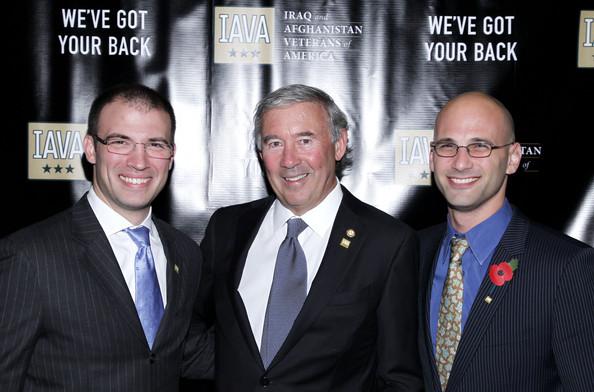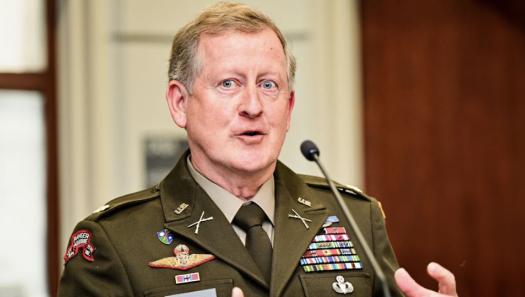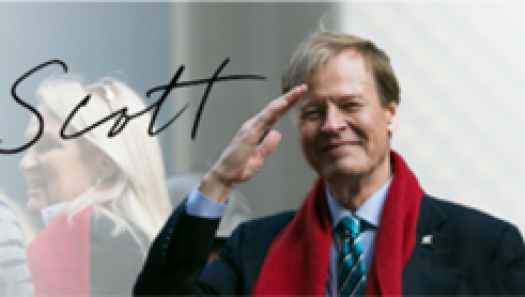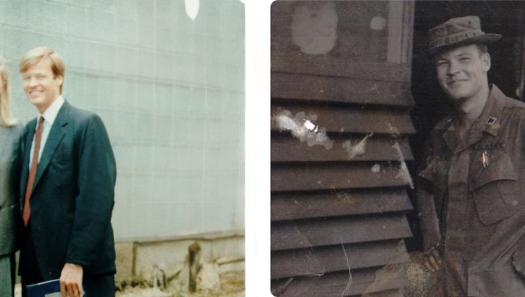WeSalute Awards
HeroVet: Ed Vick, Learning about Leadership In the Brown-Water Navy

"Vietnam," says Ed Vick, “was about growing up. As bad as it was, Vietnam changed my life for the better, all things considered.”
Ed, recently retired as the CEO of Y&R Advertising, a post that capped his career in advertising, hails from a family that served. In his senior year at the University of North Carolina, with the draft looming over his future possibilities, Ed sought advice from his father, who had been in the Navy. Yes, his dad told him, you can see some hazardous duty in the Navy, “but you can still get a warm bed and a good meal.”
In October 1966, Ed enlisted.
In 1967-’68, Lt. (j.g.) Vick served aboard the USS Mauna Loa, an ammunition ship in the South China Sea. He never set foot on Vietnamese soil. His tour up, he received orders that would have made him commanding officer of a fleet tugboat operating out of Boston Harbor. The toughest duty he would face, he was assured, would be the lobster fests on Cape Cod.
"If I’d have taken that assignment,” he reflects, relaxing in the conference room on the top floor of the Young & Rubicam skyscraper in midtown Manhattan, “I knew I’d have felt that I’d dogged my responsibility, that I’d skipped out on the war.”
A four-striper named Louis Bogan knew the commanding officer of the river patrol force along the Mekong River and its tributaries. The river patrol was nearly all volunteers, Ed learned, volunteers who suffered a 50% casualty rate. “For career officers, you’d get your ticket punched,” he was told. Not that he entertained visions of a career in the Navy, but Ed was intrigued. He pushed for the transfer. In December 1968, after going through survival school and Vietnamese language school, he arrived in Vietnam, assigned to Task Force 116.
They were right about the hazards.
Learning the Ropes
The Navy played a major role patrolling the Mekong Delta during the fighting in Southeast Asia. “For a while we were operating near the Parrot’s Beak, right at the Cambodian border, in very unpacified territory” Ed relates. “Working with our SEALs, Vietnamese Special Forces, Cambodian mercenaries, and troops from the 9th Infantry, our mission was to try to stop the infiltration by the VC into III Corps.
“On the night of January 18, 1969, at 0130 hours, under the light of a quarter moon, we were traveling up a really narrow part of the river—a 300-yard gauntlet, really—when the entire riverbank erupted. I was standing on the coxswain’s flat with a gunner when the first rocket passed between us.” Life and oblivion, Ed learned, were, literally, separated by inches.
“Then a second rocket hit us below the water line. The gunner in the stern was blown up. The stern was awash. We were sinking. We were dead in the kill zone. It was the most terrifying night I’d experienced.”
Then the cavalry came: Their sister boat pulled in behind them “and we managed to transfer all of my team onto the second boat just before the Seawolves got there firing runs at the riverbank.”
Changing the Rules
Playing cat and mouse with the enemy, Ed learned to think creatively if he was to succeed in his mission: interdicting the teams of infiltrators coming into Vietnam along the waterways from Cambodia.
Trying the untried was a lesson that would serve him well throughout his career. While standard operating procedure had been to never stray from the middle of the river, Ed concluded that this was a recipe for failure. Besides, he was, as he indelicately puts it, “sick of getting greased.”
So he innovated. He and his crew slept during the day to patrol at night. They hid their boat in the overhang along the bank to wait in ambush for infiltrators.
Sure enough, on their second night, their newfangled patrol tactic paid off. “Through the starlight scope, we saw a sampan with five or six guys in it: NVA. We opened up on them. Before this,” he notes, ‘nobody had ever caught them red-handed. What we tried quickly became a tactic commonly used by boats patrolling the Mekong.”
By the end of 1969, though, when it was clear that the United States was looking for a way out of Vietnam, Ed soured on the mission even as he continued to play the game. On October 6, 1969, a month before his tour ended, he wrote home: “[T]hey are starting a new operation in the U Minh Forest area of the Ca Mau Peninsula in the southern Delta. It has been a VC base area since before the French were here, when they were the Viet Minh. The U.S. has never before been there except for air strikes. No one is there now except for 10 PBRs [which] began patrolling two days ago and have already lost two boats and one killed and 10 wounded. At this stage it’s just insane – it’s suicidal for the boats and can never be pacified by 10 little boats. The Army won’t touch it. I’m glad I’m through with it all. . . .”
The government was “buying time with our lives to get a politically acceptable solution,” he says in retrospect. “But anyone there could have told them what would happen when we left the country.”
Ed left the country with a slew of medals, including two Bronze Stars with combat ‘V,” the Combat Action Ribbon, the Presidential Unit Citation, and the Vietnamese Cross of Gallantry, among others. He also left with something else.
For a young man with a privileged upbringing who barely got through college, Ed’s experiences in Southeast Asia focused his life and instilled in him a sense of responsibility. It matured him. It gave him perspective.
But while he was through with Vietnam, Vietnam was not quite through with him. As his career blossomed—Ed is one of the most successful advertising executives in the business—he never forgot to give something back.
As an advertising executive, he used his expertise to create public service announcements for Vietnam Veterans of America; created a fund-raising video for the Soldiers’, Sailors’, and Airmen’s Club in New York City. As a member of the Executive Committee of the New York Vietnam Veterans Memorial Commission, he devised the “It’s Time” campaign to focus attention on the need to accord veterans of the Vietnam War the respect both he and the commission felt they were due. Because, he said, “I owe something back to those who served.”
And now, in retirement, he has written a book, Slingshot, that is “based on actual events” (see Cover Story). All profits on sales of Slingshot will be donated to organizations that support veterans of the Navy’s River Patrol Force in Vietnam, and to the Police and Fire Departments of Bedford, New York, where Ed resides with his family.
Ed Vick also serves on the Board of Advisors of Veterans Advantage. To read more about his career, see Board of Advisors page.
Image Credit: Joe Kohen/Getty Images North America


